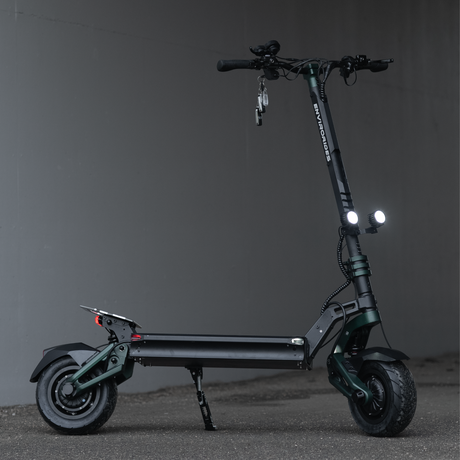Electric bikes, otherwise known as eBikes, have been gaining in popularity over the past few years. They offer riders a great way to get around quickly and efficiently while also providing some health and environmental benefits. A lot of people are now interested in buying eBikes. So, the question is: should I buy an eBike?
Well, in this article, we'll be breaking down the important information, benefits, and factors of owning an eBike.
Let's dive in!
What is an eBike?
An eBike represents a remarkable fusion of traditional cycling with modern technology. It's essentially a bicycle that has been enhanced with an electric motor and a rechargeable battery. This innovative design allows the e-bike to be propelled not only by the physical effort of the rider, but also by the electric motor - effectively augmenting the rider's pedal power.
E-bikes come in a diverse range of styles and configurations, catering to a wide spectrum of preferences and needs. These styles include, but are not limited to:
Folding Bikes: Compact and convenient, folding e-bikes are designed for easy storage and transportation. They are excellent choices for urban commuters and individuals with limited storage space.
Mountain Bikes: Electric mountain bikes, often referred to as e-MTBs, are designed for off-road adventures. They offer extra power to conquer rugged terrains and steep inclines, making them a preferred choice for outdoor enthusiasts.
Hybrid Bikes: Hybrid eBikes strike a balance between road and off-road capabilities, making them versatile options for various riding environments. They are ideal for commuting, fitness rides, and recreational cycling.
Racing Bikes: Some eBike models are engineered for speed and performance, designed to enhance the capabilities of competitive cyclists. These e-racing bikes provide an extra boost to propel riders at higher speeds.
Additionally, certain eBike models are purpose-built to cater to specific needs such as daily commuting, leisurely rides through the city, or extended trekking adventures into the countryside.
Parts of an eBike
The core components of an e-bike include the battery, motor, throttle, brakes, derailleur gears, and suspension. The battery is the power source of the bike that stores the electrical energy and provides it to the motor.
The motor is responsible for providing power to the wheels, allowing a rider to pedal with less effort. The throttle is mounted on the handlebar and is used to increase or decrease the bike’s speed, and the brakes are what slows and stops the bike.
The derailleur gears are part of the drivetrain and are responsible for changing the gears, while the suspension absorbs shocks from the terrain.
Benefits of an eBike
Several perks come with owning an eBike. These include the physical health and mental well-being benefits of being active and the environmental benefits of reducing air pollution and greenhouse gas emissions. On top of this, eBikes are usually favourable to other modes of transport for shorter journeys as they are much cheaper to buy and maintain.
Health benefits
eBikes offer a holistic approach to well-being beyond just physical fitness and health benefits. While they undoubtedly contribute to improved fitness levels, they also play a pivotal role in reducing stress and enhancing concentration.
One of the key advantages is that eBikes demand less physical effort from riders compared to traditional bicycles. This reduced physical strain allows riders to sustain longer journeys and maintain a higher intensity of activity, ultimately leading to better fitness outcomes. eBikes act as fitness enablers, making it feasible to incorporate regular exercise into busy schedules without sacrificing excessive time commitments.
Environmental benefits
eBikes offer significant environmental advantages. They reduce air pollution and greenhouse gas emissions by using electricity instead of fossil fuels. This choice helps combat climate change and improves air quality.
Additionally, eBikes operate quietly, reducing noise pollution in urban areas. This creates a more peaceful and pleasant environment for riders and pedestrians alike.
Financial benefits
When asking yourself if should I buy an eBike, one of the main concerns is surrounding the initial cost of the electric bike itself. However, although the initial purchase can seem a bit expensive, there are plenty of cost-cutting reasons to make travelling or commuting cheaper for you.
Reduced transportation costs: eBikes are highly cost-effective for daily commuting. They consume minimal electricity compared to cars or motorcycles, making them significantly cheaper to operate. You'll save on fuel, maintenance, and parking fees.
Lower maintenance costs: eBikes have fewer moving parts than traditional bikes and cars, which means lower maintenance costs. You'll spend less on oil changes, engine repairs, and other costly vehicle upkeep.
Extended vehicle lifespan: eBikes tend to have a longer lifespan than traditional bicycles because the electric motor can assist with pedalling, reducing wear and tear on the rider. This means you won't have to replace your bike as often.
Insurance savings: In many places, eBikes do not require insurance like cars or motorcycles. This eliminates the recurring expense of insurance premiums, which can be a substantial savings over time.
Parking savings: eBikes are typically easier to park and may not require paid parking. Many cities offer free or discounted parking for bicycles, helping you save on parking fees.
Tax incentives: Some regions offer tax incentives or rebates for eBike purchases to promote eco-friendly transportation. Check with your local government to see if you qualify for any financial incentives.
Reduction in depreciation: Unlike cars, eBikes tend to hold their value well, especially if you maintain them properly. This means you may recoup a significant portion of your investment when selling a used eBike.
Bike-to-Work Scheme: Many regions and countries offer bike-to-work schemes as part of their efforts to promote sustainable commuting options. These programs encourage employees to cycle to work and provide financial incentives to make it more affordable. eBikes can often be claimed under these schemes, offering additional financial benefits to commuters.
No licensing costs: Operating an eBike typically doesn't require a special license or additional fees, as is often the case with cars and motorcycles. This eliminates the cost associated with obtaining and renewing licenses.
To conclude
So the age-old question is, should I buy an eBike? eBikes offer a versatile and eco-friendly transportation solution. Whether for fitness, convenience, or adventure, they provide valuable benefits. While they may require an initial investment, the advantages in terms of health, environment, and cost savings make them a worthwhile consideration.
Ultimately, the choice to embrace an eBike depends on your individual needs and priorities, but they represent a compelling option in modern mobility.



